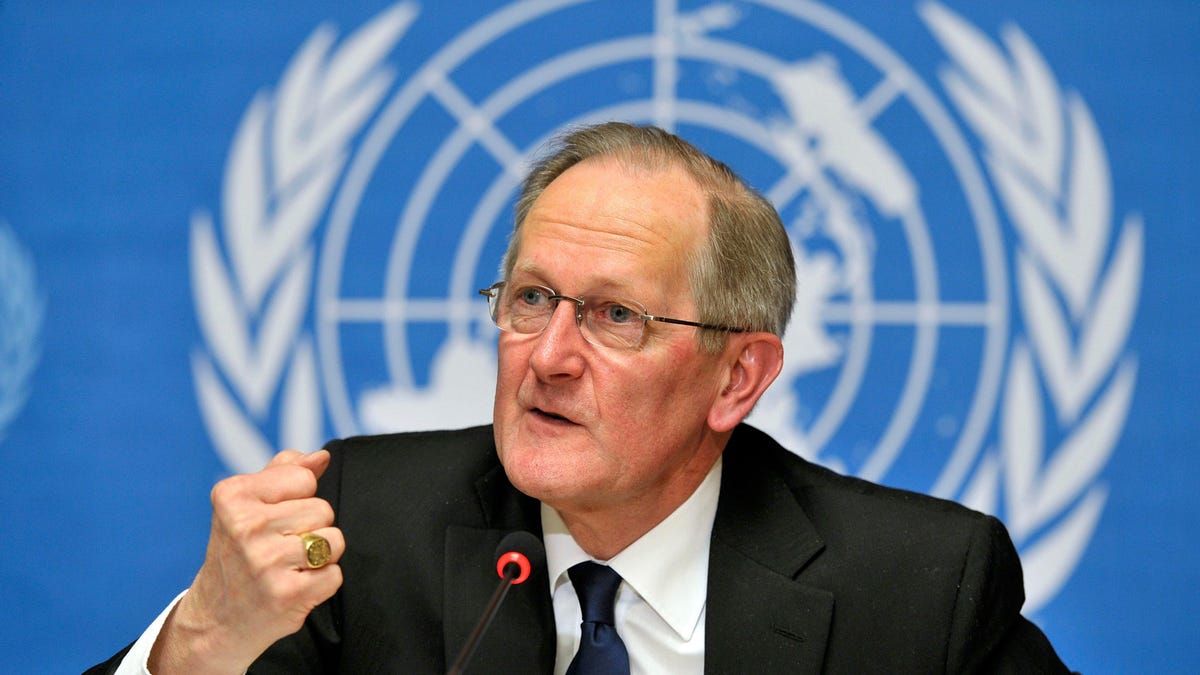U.N. General Assembly Suspends Libya From Human Rights Council
{{#rendered}} {{/rendered}}
Feb. 28: Joseph Deiss, President of the U.N. General Assembly, speaks during a press conference in Geneva, Switzerland. Deiss called for the vote to suspend Libya from the U.N. Human Rights Council and signaled its adoption by consensus by banging his wooden gavel. (AP)
The United Nations General Assembly decided unanimously to suspend Libya's membership on the Human Rights Council, a move that puts additional international pressure on Muammar al-Qaddafi.
The decision was made by consensus of all members states of the U.N., with the exception of Libya, because it was the subject of the General Assembly meeting.
"These actions should send a strong and important message," declared U.N. Secretary General Ban Ki-Moon. "There is one community and those who commit crimes against humanity will be punished...time is of the essence, thousands of lives are at stake. It is our collective duty to stand for human rights."
{{#rendered}} {{/rendered}}The move did not expel Libya from the body, which means the nation could potentially return if there is a change of government. In 1974, South Africa was temporarily suspended from participation in the General Assembly because of apartheid policies at the time, but it was not "formally" suspended.
Libya was elected to the Geneva-based body last May, and even served as president of the Council's predecessor, the discredited Human Rights Commission, in 2003. Critics have long denounced the Council for what they say is its hypocritical blind eye toward abuses around the globe and its singular focus on Israel. Other members include China, Saudi Arabia, Cuba and Pakistan.
"The credibility of the international community, the General Assembly, the Security Council and the Human Rights Council is at stake," proclaimed General Assembly President Joseph Deiss.
{{#rendered}} {{/rendered}}But Venezuelan Ambassador Jorge Valero, whose mission up to the last minute threatened to oppose the resolution, expressed reservations about the decision, and used it an an opportunity to attack the United States. "An imperialist country is unilaterally and visibly deploying its military and nuclear machinery in order to carry out an armed attack against Libya...Venezuela calls for the rejection of war-mongering mobilization of the U.S. Air force and Navy," he said.
Valero claims the forces are being deployed "to establish, as always, a protectorate to violate (human rights) in one of the most important sources of oil and energy in the Middle Eastern region."
U.S. Ambassador to the United Nations Susan Rice angrily denounced the comments.
{{#rendered}} {{/rendered}}"It's shameful that one member state, whose own reprehensible record speaks for itself, would manipulate this occasion to spread lies, foster fear, and sow hate," she said. "The General Assembly, by contrast today, has acted in the noblest traditions of the United Nations, and made it clear that governments that turn their guns on their own people, have no place on the Human Rights Council."
"This unprecedented action sends another clear warning to Mr. Qaddafi, and those who still stand by him, they must stop the killing," she added.
The Council was established in 2006 to replace the Human Rights Commission. Then U.S. Ambassador John Bolton voted against it, making the U.S. one of only four nations to oppose its creation, because he believed it biased. The Bush administration demanded meaningful reforms for a body that has not investigated human rights abusing nations, such as Iran. But the Obama administration sought membership, saying it could work to reform the Council from within.
{{#rendered}} {{/rendered}}But it turns out that as the United Nations took its action to punish Libya, the Council is posed to issue a report praising Libya's human rights record before the recent unrest. A March 18 vote is set to pass the Council's "Universal Periodic Review" of member states, a 23-page report which includes commending Libya for "the country's commitment to upholding human rights on the ground."
"Libya should be thrown off of the Human Rights Council," said Nile Gardiner, the Director of the Margaret Thatcher Center for Freedom at the Heritage Foundation, in Washington, D.C." The Council itself has become the playground of international dictators and tyrants, and there should be no place at all for a regime like Libya within a U.N. body. The whole Council, I think, has become a complete and absolute farce."
Diplomatic sources tell Fox News that they are considering a possible postponement of the review of Libya's human rights record in light of recent developments.
{{#rendered}} {{/rendered}}"Within the United Nations we have rank hypocrisy, at the moment, on the Libyan issue," Gardiner said. "Libya is, without a doubt, one of the world's very worst human rights abusers, but here we have the U.N.'s premiere human rights wing about to release a report describing Libya as making progress on human rights."
He also said there should be no place on the Council for any dictatorial regimes that violate human rights.
